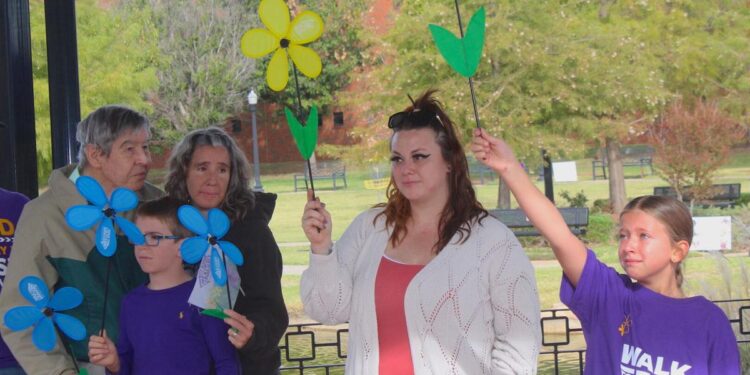Kat Funaki was 18 when her father, a retired veteran in his early 60s, was diagnosed with dementia.
After a stroke, he forgot how to speak, he forgot where he was, or what he just did. But one thing he always remembered: his family.
“He didn’t forget who we were,” she said. This made a “tough” situation a little bit more bearable.
On Saturday morning, Funaki was the Walking Chair for the March to End Alzheimer’s at Bentley Gardens at Cameron University. Hundreds came together to contribute to the fight to end the deadly disease and show support, among them Alzheimer’s patients (who carried a blue flower), caregivers (yellow flower), supporters (orange flower) and those who lost a loved one, or loved ones (purple flower).
About six million people in the United States and 70,000 in Oklahoma suffer from Alzheimer’s, Tarra Bates said during her speech at the opening ceremony of the event, encouraging those who came to donate online and chip in towards the goal of raising $45,000. The Alzheimer’s Association, she added, supports over 1,000 projects in 53 countries with $360 million.
“Alzheimer’s destroys families, finances and futures,” Bates said. “The end of Alzheimer’s will come through research. There are multiple FDA approved treatments now for patients in early stages. That’s amazing progress. It gives us more time to hug the people we love and share memories.”
Bates called on the U.S. Congress to make the fight against Alzheimer’s a “national priority” and allocate funds for research, promising that “one day, we’ll end this disease. You can help build momentum.”
Bates recalled her own experiences, with her dad, also a retired veteran, passing away from the disease.
“He didn’t even realize it,” she said, struggling with tears. “We didn’t know a lot about it, but we knew we eventually would lose him. I’m blessed I was able to be with him when he took his last breath.”
Now, her mom has dementia.
“You watch the person you knew all you life slowly change,” she said, emphasizing the struggle not only for patients, but especially for their families and other caregivers who have no choice but to come to terms that the person they love sometimes doesn’t even know who they are.
Bates recalled how she and her family had to settle in a new situation in which the “man of the family” who used to care about them all of a sudden had to be taken care of.
With that background, Bates has made it her mission to bring “this devastating disease” to an end.
Want to reach a local audience and grow your business?
Our website is the perfect platform to connect with engaged readers in your local area.
Whether you're looking for banner ads, sponsored content, or custom promotions, we can tailor a package to meet your needs.
Contact us today to learn more about advertising opportunities!
CONTACT US NOW




